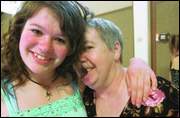
Kids return for summer fun
Chernobyl's children are welcomed back
Photo by The Union photos/John Hart
Vika Tkach hugs Rosalee Evans, her adopted grandmother, at Monday
night's welcoming party for the Nevada County Chernobyl Children's Project
at St. Patrick's Church on Chapel Street in Grass Valley. For a photo gallery
The Union photos/John Hart
By Soumitro Sen, soumitros@theunion.com
June 20, 2006
On April 26, 1986, the lives of people living in
Chernobyl, Ukraine, changed forever.
An explosion at a local nuclear plant released large amounts of
radiation into the atmosphere, negatively
affecting the residents' health. Several thousands were affected with
radiation-related illnesses.
Two decades later, the physical well being of some of Chernobyl's
residents is still in jeopardy
The Nevada County Chernobyl Children's project is one of many
nonprofit organizations that bring children from Chernobyl to the U.S.
for a healthy respite.
On Monday evening, the organization threw a party at St. Patrick's
Church in Grass Valley to welcome 27 children from Chernobyl who
arrived in town on June 15. They will stay with various host families till
July 29.
Six of children in the group are visiting the U.S. for the first time; the
rest have been to the country before. The organization paid for the
travel expenses of the first-time visitors while former host families
sponsored the returning children for an approximate amount of $1,500
per child.
"They (the children) are located in the general area of Nevada County and Placer County," said Laura Christofferson, president and project director of the Nevada County Chernobyl Children's Project. "They go on vacations with the (host) families; we have activities planned for them."
Many of the visiting children come from underprivileged circumstances.
"Some children who come here do not have an indoor toilet or hot running water," said Christofferson, who's been twice to Belarus, near Chernobyl. "The town children live in apartments, the outside (of which) is worn down. If the elevator breaks, it's never repaired.
"They have good schools but they don't have the opportunities that we have here in America. A doctor does not earn any more than a teacher does. A regular family would live on an income of $300 to $500 a month. Because of their lack of income, they are not able to move out of some areas that are contaminated."
Lena Maiseichyk, 15, has come every year since 2000 and has lived with Christofferson's family. In many ways, Maiseichyk has become a part of the family.
"I am happy; I am comfortable here," she said in staccato English. "I like everything ... I love swimming. I like to go camping."
Maiseichyk even refers to Christofferson as "Mom."
"She is my daughter in the summertime," said Christofferson. "I immediately bonded to her and my family, also. The day she leaves, we start counting the days when she will return."
Lori Leaman, a resident of Grass Valley, has been hosting Zhanya Baltsevich, 16, for the past three years. She calls him her "second son" and feels as though he never left her when he returns each year.
According to Leaman, having Baltsevich with her family every summer widens her children's perspective on the world.
"They learn to appreciate other cultures," she said. "They learn to understand a different way of life. It gives them empathy for other cultures and gives them a bigger picture of the world. There's a whole other world out there."
Last year we had some great press and an enthusiastic response from the local communities. Here is what a few of them had to say.
The press 2006


Vika Tkach hugs Rosalee Evans, her adopted grandmother, at Monday night's welcoming party for the Nevada County Chernobyl Children's Project at St. Patrick's Church on Chapel Street in Grass Valley. For a photo gallery of this event, go to theunion.com/photos.
The Union photos/John Hart
Twinkle Toes the clown (otherwise known
as Barbara Francis) paints the face of
Dasna Navolochnata on Monday night before
the party.
